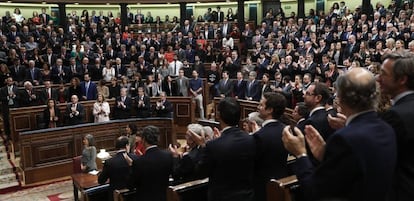Congress set to approve reform of Spain’s Franco-era secrecy laws
The government may finally follow other democracies by setting time limit on classified documents
Spain’s Congress is due Tuesday to open the door to reform of the country’s Official Secrets Act, which dates back to 1968 when the country was under the military rule of General Francisco Franco. It was last revised in late 1978, as Spain began its transition to democracy. Congress will vote on an amendment to the disclosure of government information put forward by the Basque Nationalist Party (PNV) that for the first time would set a 25-year limit on secret material and 10 years on classified information, giving exclusive authority to the government of the day to categorize documents.

The proposal is unlikely to face any obstacles: on April 27, Congress voted by 219 to 111 in favor of tabling the bill. Only the Popular Party (PP) – then heading an interim administration, and now in power – voted against it.
Emerging center-right party Ciudadanos, whose 32 deputies have given their support to the minority PP administration in Congress, has said that the Official Secrets Act needs to be completely overhauled, rather than amended. Ciudadanos may do a U-turn on its position and vote against the proposal.
Spain is more secretive than the Vatican
Historian Juan Carlos Pereira
Mikel Legarda of the PNV agrees that the Official Secrets Act requires a roots-and-branches revision, but added: “The government will never act unless forced to, because at the end of the day, all governments are comfortable with legislation that gives them a free hand.”
He pointed out that successive administrations have made no effort to change secrecy laws, and added that other groups in Congress can make amendments to his party’s proposals to introduce further change.
The PNV’s proposal gives the government of the day, via the Cabinet, the exclusive capacity to deliberate on the sensitivity of information. Until now, the Joint Chiefs of Staff have also been able to unilaterally declare information secret.
Spain is one of the few democracies that does not have an established time limit after which classified information must be released into the public domain: in the United Kingdom, the limit is 30 years; in the United States, between 25 and 50; and in France 50 years. In 2012, then-Defense Minister Pedro Morenés prevented the declassification of 10,000 documents from between 1936 and 1968, saying that they could “damage” the country’s diplomatic relations and that they were not a priority.
Successive administrations have made no effort to change Spain’s secrecy laws
The Foreign Ministry is equally secretive: in 2010 it secretly approved measures effectively classifying all of its archives.
“Spain is more opaque than the Vatican, regarded as the paradigm of secrecy, but Rome has just declassified documents about the role of the Argentinian Catholic Church during the military dictatorship there,” said Juan Carlos Pereira, Professor of History at the Complutense University of Madrid.
The Defense Ministry has claimed that it lacks the resources to declassify documents about the Spanish Civil War and the labor camps set up by the military regime of Franco in its aftermath where Republican prisoners of war were sent, but has just published online some 1,900 pages of declassified information about alleged UFO sightings.
Spain introduced transparency legislation in 2012, but has been accused of using the courts to prevent people from accessing information.
English version by Nick Lyne.
Tu suscripción se está usando en otro dispositivo
¿Quieres añadir otro usuario a tu suscripción?
Si continúas leyendo en este dispositivo, no se podrá leer en el otro.
FlechaTu suscripción se está usando en otro dispositivo y solo puedes acceder a EL PAÍS desde un dispositivo a la vez.
Si quieres compartir tu cuenta, cambia tu suscripción a la modalidad Premium, así podrás añadir otro usuario. Cada uno accederá con su propia cuenta de email, lo que os permitirá personalizar vuestra experiencia en EL PAÍS.
¿Tienes una suscripción de empresa? Accede aquí para contratar más cuentas.
En el caso de no saber quién está usando tu cuenta, te recomendamos cambiar tu contraseña aquí.
Si decides continuar compartiendo tu cuenta, este mensaje se mostrará en tu dispositivo y en el de la otra persona que está usando tu cuenta de forma indefinida, afectando a tu experiencia de lectura. Puedes consultar aquí los términos y condiciones de la suscripción digital.









































